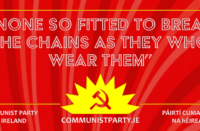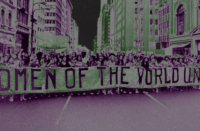The airways and newspapers have been full of discussion around the “housing crisis”, its nature and possible causes and effects. What was clear from the recent local election results is that the majority of those who voted did so for parties who support the status quo, who support the economic system we live under, or at least voted for no significant challenge or change to it, albeit with a desire to tinker around the edges.
The dominant ideology is still shaping how people act and respond to issues that affect them.
Housing is/was believed by most of the left to be the critical issue and thereby a vote catcher. They see housing as an easy attack on the soft underbelly of the powerful elites that run and control our lives.
Maybe there is a need for a reassessment of the impact of the “housing crisis”. The establishment are not interested in building large scale public housing. Rising house prices reinforce support for Fine Gael and Fianna Fáil in their core voter base, which will ensure they keep getting elected. Rising house prices, asset inflation, is built into the system and reflects the financialistion of housing, leading to the financialisation of politics. That is why housing is not the electoral issue that some on the left think it is.
To a significant voting section of the electorate it is in their material self interest to want housing prices to keep rising. In addition, the state will protect the banks and financial institutions at all costs. A significant section of the voting population are people who are up to their necks in debt through mortgage repayments. So long as those prices keep going up, the stability of the financial sector is the critical priority for the state.
A significant number of voters are mortgaged to the hilt and don’t want negative equity, instead they want house prices to rise. While for workers with no pension, their house is their only asset for retirement, and for others’ end of life care, the “Fair Deal Scheme”. The political establishment and the state have forged many mechanisms to control people and their capacity to buck the system. The current system suits workers who already have a home. Increased household debt has also been proven to be connected to reduced industrial militancy in the unionised working class.
In relation to the private rental market, having a plentiful supply of cheaper public housing would undermine the private and corporate landlords, and the profitability and capitalisation levels of Irish Banks. This is reflected in the situation where many urban and rural councils have adopted a policy of securing long-term leases on privately developed housing for rent, with regular rent reviews built in to their contracts. Thus giving landlords private and corporate guaranteed rental income for 25 years, after which the asset will be returned to them refurbished by the state, and with 25 years of value accumulated.
The state has effectively stitched into the housing market permanent financialisation with interlocking interests. There will be a slow drip-feed of private housing to buy in order not the flood the market and thereby causing a possible negative equity.
So the demand for public housing owned and controlled by the state has to prevent the massive and ongoing transfer of public wealth to the owners of private capital. The need for public housing and reasonable rents can really only be delivered by a government who is willing to challenge powerful financial interests, both domestic and foreign. Here, the question of nationalisation of all corporate housing stock currently being rented by the state has also to be considered as a necessary step.
To address the housing crisis meaningfully is a significant challenge to the economic system in Ireland today, but to get there there is a need to both understand and unravel the various ways in which a section of the working class’ own material interests are tied to rising house prices.






